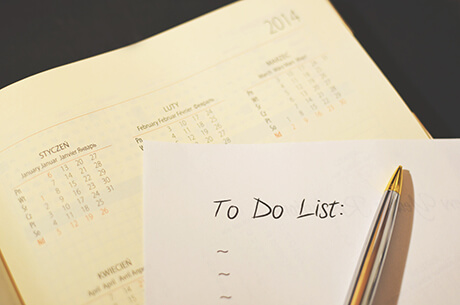Every family can relate to a crazy long list of competing priorities, right? Spending quality family time at home vs. keeping the kids active. Saving money for college vs. taking nice vacations. One-on-one time with the kids or date night with your spouse. Putting in more hours at work to earn more money for the family or coaching the soccer team. The list goes on, and in the end, things get left undone and we feel unaccomplished because we are focusing on too many things at once. If we worry about every detail in our life, we won’t be able to see the forest for the trees. Our life will be filled with anxiety. This life is an exhausting one.
Everyday new things are added to our to-do list, the kids need something for school, your spouse needs something from the store, the house needs to be picked up, you want to go through the toys or clothes and purge, it doesn’t matter what it is, there is always something new and something that doesn’t get done. How do you decide what is the priority? What may be your priority isn’t your spouse’s, or your children’s, or even someone else’s in a similar situation. It is YOUR priority and YOU decide what works best for you. But, how?

Sometimes we start with little things that can get done quickly to make ourselves feel better and accomplished, but does that ever really move the needle on what needs to get done? The more cluttered your mind is, the more cluttered your space tends to become. Last weekend, I started cleaning out a drawer, which then catapulted me to clean out my closet and since I had so much motivation and sense of accomplishment I kept going. Seeing this, my husband started going through his clothes and purging what he doesn’t wear anymore. I didn’t prompt this or suggest this, it just kind of happened. Then, I noticed that my daughters were doing the same thing (well most of them), again, with no prompting or suggesting.
Then I noticed that my oldest daughter didn’t. It was ok, as it wasn’t my intention to get everyone else to do it, I just started on something that was on my to-do list. It got me thinking, she has a lot on her mind right now, she is finishing up her senior year, getting ready to make the move to college in the fall, and her room is slightly cluttered. I won’t say messy, but cluttered is a good word; not as organized as she would normally keep it. There is a direct correlation with how cluttered our minds can get and how cluttered our space can get. We need to take a step back and reorganize our mind and decide our priorities to make sure we get things done that need to get done.
Some people tend to get overwhelmed when they have a long list of things that need to get done. They may shut down and accomplish nothing because they don’t know where to start; so instead of starting somewhere they just ignore everything. Going from overwhelmed and everything being important to prioritizing things isn’t easy and isn’t something that is just going to happen. You need to set a plan to help you get there.
Use your judgement, this is going to be your first guide to setting your priorities. Follow your gut feeling and let that help to “sharpen” your judgement. Have you ever felt anxiety, guilt, or sheer panic when you realized that you forgot that you had to bake 24 cupcakes for tomorrow and it’s 10 pm, or you had a deadline for a client and you haven’t started what you need to do? Those feelings can either be paralyzing or used as a springboard to move forward. Often, the more panic we feel, the more in-tune we become with what we need to get done. Use that to help you prioritize what needs to be done first, then second, and so on.

Here are some helpful tips to take charge and set your priorities:
- Create a plan and put specific times for tasks to be completed
- Map out your daily tasks – these are different than your to-do list
- Eliminate distractions when you need to complete important tasks
- Create a list, set aside 15 minutes each night before you go to bed and plan for tomorrow
- Take actions in small steps – the key is to not get overwhelmed
- Be prepared for your priorities to change
- Check in with yourself often – are your priorities still in line and are you holding yourself accountable
Don’t get frustrated if you need some time to figure out what your priorities are so you can set them straight. Be kind to yourself and remember that it’s completely normal for your priorities to change over time. Habits take at least 21 days to start to take form, so don’t give up if you don’t think your plan is working. Keep track of days by using hash marks on a calendar or putting marbles in a jar. It’s ok if you miss a day, but if you do, you must start back at 1. The repetition is key to building new habits. Recent studies in the European Journal of Social Psychology show that it takes an average of 66 days for a new habit to really stick or to break on old habit. Eventually, with a little bit of patience and persistence, you can figure out what’s most important and take charge of your life, so don’t give up. If you need a little direction, give us a call here at Cameron Pediatrics Counseling and set up an assessment, we will be happy to help you and your family come up with a plan that works for you.
